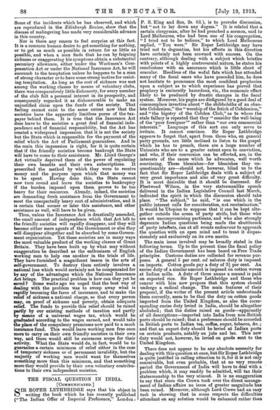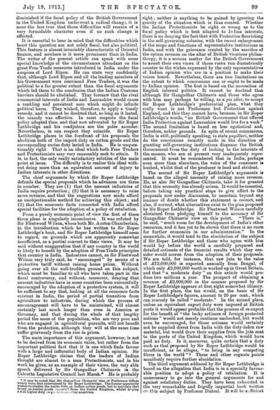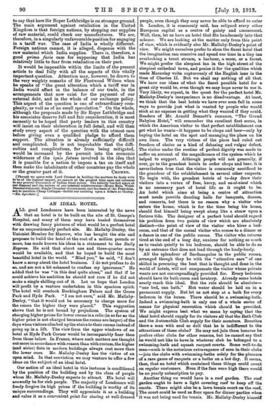THE FISCAL QUESTION IN INDIA. [COMMUNICATED.] S IR ROPER LETHBRIDGE says
that his object in writing the book which he has recently published (" The Indian Offer of Imperial Preference," London : P. S. King and Son, 2s. 6d.), is to provoke discussion, but " not to lay down any dogma." It is related that a certain clergyman, after he had preached a sermon, said to Lord Melbourne, who had been one of his congregation, " I tried not to be tedious," to which Lord Melbourne replied, " You were." Sir Roper Lethbridge may have tried not to dogmatize, but his efforts in this direction have certainly not been crowned with success. On the contrary, although dealing with a subject which bristles with points of a highly controversial nature, he states his conclusions with an assurance which is little short of oracular. Heedless of the woful fate which has attended many of the fiscal seers wbo have preceded him, ho does not hesitate to pronounce the most confident prophecies upon a subject as to which experience has proved that prophecy is eminently hazardous, viz., the economic effect likely to be produced by drastic changes in the fiscal system. Moreover, his pages are disfigured by a good deal of commonplace invective about " the shibboleths of an obso- lete Cobdenism," the " worship of the fetish of Cobdenism," and " the bigotry of the Cobden Club," as to whom the stale fallacy is repeated that they " consider the well-being of the 'poor foreigner" rather than "our own commercial interests." Language of this sort can only serve to irritate. It cannot convince. Sir Roper Lethbridge appears to forget that, apart from those who, on general party grounds, are little inclined to listen to the gospel which he has to preach, there are a large number of Unionists who are to a greater extent open to conviction, and who, if their conversion can be effected, are, in the interests of the cause which he advocates, well worth convincing. These blemishes—for blemishes they un- questionably are—should not, however, blind us to the fact that Sir Roper Lethbridge deals with a subject of very great importance and also of very great difficulty. It is most desirable that it should be discussed. Sir Fleetwood Wilson, in the very statesmanlike speech delivered in the Indian Legislative Council last March, indicated the spirit in which the discussion should take place. " The subject," he said, " is one which in the public interest calls for consideration, not recrimination." It would be Utopian to suppose that it can be kept alto- gether outside the arena of party strife, but those who are not uncompromising partisans, and who also strongly deprecate Indian questions being made the shuttlecock of party interests, can at all events endeavour to approach the question with an open mind and to treat it dispas- sionately and exclusively on its own merits.
The main issue involved may be broadly stated in the following terms. Up to the present time the fiscal policy of the Indian Government has been based on Free Trade principles. Customs duties are collected for revenue pur- poses. A general 5 per cent. ad valorem duty is imposed on imports. Cotton goods pay a duty of 31 per cent. Au excise duty of a similar amount is imposed. on cotton woven at Indian mills. A duty of three annas a maund is paid on exported rice. Sir Roper Lethbridge and those who concur with him now propose that this system should undergo a radical change. The main features of their proposal, if the writer of the present article understands them correctly, seem to be that the duty on cotton goods imported from the United Kingdom, as also the corre- sponding excise duty levied in India, should be altogether abolished ; that the duties raised on goods—apparently of all descriptions—imported into India from non-British ports should be raised; that a preference should be accorded in British ports to Indian tea, coffee, sugar, tobacco, &c. ; and that an export duty should be levied at Indian ports on certain products, notably on jute and lac. This new duty would not, however, be levied on goods sent to the United Kingdom.
There does not appear to be any absolute necessity for dealing with this question at once, but Sir Roper Lethbridge is quite justified in calling attention to it, for it is not only conceivable, but even probable, that at no very remote period the Government of India will have to deal with a problem which, it may readily be admitted, will tax their statesmanship to the very utmost. It is no exaggeration to say that since the Crown took over the direct manage- ment of Indian affairs no issue of greater magnitude has been raised. Moreover, although Lord Crewe had an easy task in showing that in some respects the difficulties attendant on any solution would be enhanced rather than diminished if the fiscal policy of the British Government in the United Kingdom underwent a radical chauga, it is none the less true that those difficulties will remain of a very formidable character even if no such change is effected.
It is essential to bear in mind that the difficulties which beset this question are not solely fiscal, but also political. This feature is almost invariably characteristic of Oriental finance, and nowhere is it more prominent than in India. The writer of the present article can speak with some special knowledge of the circumstances attendant on the great Free Trade measures introduced in India under the auspices of Lord Ripon. He can state very confidently that, although Lord Ripon and all the leading members of his Government were convinced Free Traders, it was the political to a far greater extent than the fiscal arguments which led them to the conclusion that the Indian Customs barriers should be abolished. They foresaw that the rival commercial interests of India and Lancashire would cause a rankling and persistent sore which might do infinite political harm. They wished, therefore, to apply a timely remedy, and it cannot be doubted that, so long as it lasted, the remedy was effective. In most respects the fiscal policy adopted then and that now advocated. by Sir Roper Lethbridge and his coadjutors are the poles asunder. Nevertheless, in one respect they coincide. Sir Roper Lethbridge places in the forefront of his proposals the abolition both of the import duty on cotton goods and the corresponding excise duty levied in India. He is unques- tionably right That is an ideal which both Free Traders and Protectionists may very reasonably seek to attain. It is, in fact, the only really satisfactory solution of the main point at issue. The difficulty is to realize this ideal with- out doing more than an equivalent amount of injury to Indian interests in other directions.
The chief arguments by which Sir Roper Lethbridge defends the special proposals which be advances are three in number. They are (1) that the nascent industries of India require protection ; (2) that it is necessary to raise more revenue, and that the suggestions now made afford an unobjectionable method for achieving this object ; and (3) that the economic facts connected with India afford special facilities for the adoption of a policy of retaliation.
From a purely economic point of view the first of these three pleas is singularly inconclusive. It was refuted by Sir Fleetwood Wilson, whom both Mr. Austen Chamberlain, in the introduction which he has written to Sir Roper Lethbridge's book, and Sir Roper Lethbridge himself seem to regard, on grounds which are apparently somewhat insufficient, as a partial convert to their views. It may be said without exaggeration that if any country in the world is likely to benefit by the adoption of Free Trade principles that country is India. Industries cannot, as Sir Fleetwood Wilson very truly said, be " encouraged " by means of a protective tariff without raising home prices. Without going over all the well-trodden ground on this subject, which must be familiar to all who have taken part in the fiscal controversy, and without, moreover, denying that nascent industries have in some countries been successfully encouraged by the adoption of a protective system, it will be sufficient to say that, looking at all the economic facts existent in India, the period of partial transition from agriculture to industries, during which the process of encouragement will have to be maintained, will almost certainly last much longer than even in America or Germany, and that during the whole of that lengthy period the mass of the population, who are very poor and who are engaged in agricultural pursuits, will not benefit from the protection, although they will at the same time suffer grievously from the rise in prices.
The main importance of this argument, however, is not to be derived from its economic value, but rather from the important political fact that it is one which finds favour with a large and influential body of Indian opinion. Sir Roper Lethbridge claims that the leaders of Indian thought are almost to a man Protectionists, and in his work he gives, as an example of their views, the very able speech delivered by Sir Gangadhar Chitnavis is the Calcutta Legislative Council last Maroh.* He is probably • It may be noted that Sir Ganladhar Chitnavis' idea of Preference differs widely from that entertained by Sir Roper Lethbridge. The former apparently wishes to abolish the excise duty cm Indian cotton goods, but to maintain that levied on similar goods imported from the United Kingdom, whilst levying a aim higher duty on goAs from other countries. right ; neither is anything to be gained by ignoring the gravity of the situation which is thus created. Whether the Indian Protectionists be right or wrong as to the fiscal policy which is best adapted to Indian interests, there is no denying the fact that with Protection flourishing in the self-governing colonies, with the recent enlargement of the scope and functions of representative institutions in India, and with the grievance created by the sacrifice of the opium revenue on the altar of British vicarious philan- thropy, it is a serious matter for the British Government to assert their own views if those views run diametrically counter to the wishes expressed by the only representatives of Indian opinion who are in a position to make their voices heard. Nevertheless, there are two limitations on the extent to which concessions can or ought to be made to Indian opinion. The first is based on the necessities of English internal politics. It cannot be doubted that although Sir Gangadhar Chitnavis and those who agree with him may perhaps be willing, as a pis alter, to accept Sir Roper Lethbridge's preferential plan, what they really want is not Preference but Protection against England, and this they cannot have, because, in Sir Roper Lethbridge's words, "no British Government that offered India Protection against Lancashire would live for a week." The second limitation is based on less egotistical and, therefore, nobler grounds. In spite of recent concessions, India is still, politically speaking, in slate pupillari, neither do the concessions recently made in the direction of granting self-governing institutions dispense the British Government from the duty of looking to the interests of the masses, who are at present very inadequately repre- sented. It must be remembered that in India, perhaps even more than elsewhere, the voice of the consumer is hushed, whilst that of the producer is loud and strident.
The second of Sir Roper Lethbridge's arguments is based on the alleged necessity of raising more revenue. He, as also Sir Gangadhar Chitnavis, take it for granted that this necessity has already arisen. It would be essential, before taking any practical steps to give effect to the proposals now under discussion, to ascertain beyond any manner of doubt whether this statement is correct, and also, if correct, what alternatives exist to the plan proposed by Sir Roper Lethbridge. Sir Fleetwood Wilson carefully abstained from pledging himself to the accuracy of Sir Gangadhar Chitnavis' view on this point. " There is," he said, " much room for the development of India's other resources, and it has yet to be shown that there is no room for further economies in our administration." In the meanwhile, it would tend to the elucidation of the subject if Sir Roper Lethbridge and those who agree with him would lay before the world a carefully prepared and detailed estimate of the financial results which they con- sider would accrue from the adoption of their proposals. We are told, for instance, that raw jute to the value of .213,000,000 is exported annually from Bengal, of which only £3,000,000 worth is worked up in Great Britain, and that " a moderate duty " on this article would pro- duce two millions a year. The prospect of obtaining a revenue of £2,000,000 in the manner proposed by Sir Roper Lethbridge appears at first sight somewhat illusory. In the first place, the tax would, on the basis of Sir Roper Lethbridge's figures, amount to 20 per cent., which can scarcely be called " moderate." In the second place, unless an equivalent export duty were imposed at British ports it would appear probable that the process of re-export for the benefit of "the lucky artizans of foreign protected nations " would not merely continue unchecked, but would even be encouraged, for those artisans would certainly not be supplied direct from India with the duty-laden raw material, but would draw their supplies from the jute sent to the ports of the United Kingdom, which would have paid no duty. Is it, moreover, quite certain that a duty such as that proposed by Sir Roper Lethbridge would be insufficient, as he alleges, " to bring in any competing fibres in the world " P These and other cognate points manifestly require further elucidation.
The third argument adduced by Sir Roper Lethbridge is based on the allegation that India is in a specially favour- able position to adopt a policy of retaliation. It is unnecessary to go into the general arguments for and against retaliatory duties. They have been exhausted in the very remarkable and frigidly impartial book written on this subject by Professor Dietzel. It will be a ifficient
to say that here Sir Roper Lethbridge is on stronger ground. The main argument against retaliation in the United Kingdom is that foreign nations, by stopping our supplies of raw material, could check our manufactures. We are, therefore, in a singularly unfavourable position for engaging in a tariff war. The case of India is wholly different. Foreign nations cannot, it is alleged, dispense with the raw material which India supplies. There is, therefore, a good prima facie case for supposing that India has relatively little to fear from retaliation on their part.
It would be impossible within the limits of the present article to deal fully with all the aspects of this vitally important question. Attention may, however, be drawn to the very weighty remarks of Sir Fleetwood Wilson when he speaks of " the great alteration which a tariff war in India would effect in the balance of our trade, in the arrangements that now exist for the payment of our external debt, and in the whole of our exchange policy. This aspect of the question is one of extraordinary com- plexity, as well as of no small speculation." On the whole, although the proposals made by Sir Roper Lethbridge and his associates deserve full and fair consideration, it is most earnestly to be hoped that party leaders in this country will insist on their elaboration in full detail, and will then study every aspect of the question with the utmost care before giving even a qualified pledge to afford them support. The situation is already sufficiently difficult and complicated. It is not improbable that the diffi- culties and complications, far from being mitigated, would be increased by the pursuit into the economic wilderness of the ignis fatuus involved in the idea that it is possible for a nation to impose a tax on itself and then make the inhabitants of other countries pay the whole [Thongh we agree with Lord Cromer in holding the matters he deals with to be of the highest import, we cannot at the present time open our columns to any general discussion of Indian fiscal policy. The strictly limited space at our disposal and the nature of our internal controversies—Home Rule, Welsh Disestahlishment, Single-Chamber Government, and the basis of the Franchise, not to mention Cheap Cottages—forbid our entering upon a debate so thorny.
—En. Siectator.]












































 Previous page
Previous page